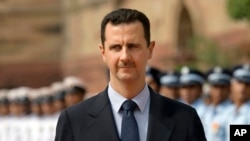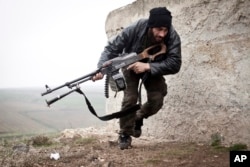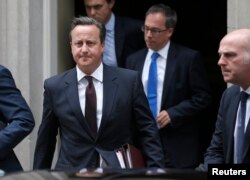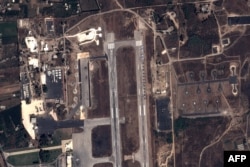Syrian rebels are reacting with anger at the apparent shift in the policies of some Western governments over whether President Bashar al-Assad should remain in power for a transitional period in any political settlement of the country’s brutal four-year-long civil war.
Rebel leaders accuse Western governments of kowtowing to Russia, which has been engaged in a military buildup in Syria and has dispatched two dozen advanced ground-attack warplanes to assist Assad.
And they warn the beneficiary of the shift in policy will not only be the Assad regime, but also the Islamic State terror group with more fighters likely to join the extremists in reaction.
“Russia’s military buildup in Syria, which amounts to direct occupation, especially at the coastal area, risks further fueling the conflict and acts as a prelude for partitioning our country,” warned Syrian rebel commanders with the Western-backed Free Syrian Army and the leaders of the Syrian National Coalition, a political umbrella organization.
In a joint statement they added, “Besides violating Syria’s sovereignty and being aimed at propping up the regime rather than for fighting terrorism as some claim, this intervention is intended to fill the vacuum, which should have been filled by the Syrian people.”
They said they were astonished “how aggression and tyranny are regarded as pillars” for a political solution to the war and “we condemn the ongoing attempts to remarket the murderous Assad regime and its head.”
The rebel leaders added, “The world will hear the word ‘no’ from us.”
No long-term future
Britain’s Prime Minister David Cameron is the latest Western leader to suggest that Assad had no “long-term” future, but he said the Syrian leader could stay in power during an agreed political transition.
Germany, Australia and the United States have also in recent days talked about the possibility of keeping the Syrian leader in place in a deal to end the civil war that has left more than 250,000 people dead.
Western officials say in order to defeat the Islamic State group and roll back the extremists’ “caliphate” straddling Syria and Iraq, Syrian state institutions, including the Syrian army, need to remain intact.
Assad’s main foreign backers, Russia and Iran, welcomed the apparent dropping of the West’s demand the Syrian leader should go immediately.
“I think today everyone has accepted that President Assad must remain so that we can combat the terrorists,” Iran’s president Hassan Rouhani told CNN in an interview over the weekend.
Before this week’s annual meeting of the U.N. General Assembly, Russia President Vladimir Putin insisted in a television interview with CBS that Russian forces being dispatched to Syria would not have a ground combat role.
Putin said the Syrian president's troops were "the only legitimate conventional army” in the country and Russia "would be pleased to find common ground for joint action against the terrorists” with the international coalition against the Islamic State group.
Western shift
The shift in Western policy about Assad’s short-term future appears to have been propelled by two main factors, the burgeoning refugee crisis roiling Europe and the Russian military buildup in Syria in support of Assad's government.
On Sunday, Iraqi officials announced they had signed an agreement on security and intelligence coordination with Russia, Iran and Syria to help fight Islamic State militants.
Some analysts argue a political settlement based on Assad remaining in the short-term is likely unworkable, saying the Western focus on the Islamic State group ignores the “more complex dynamics” behind the conflict.
“It ignores the fact that well over 100,000 Syrian men currently fighting the Assad regime have sworn to do so until he is removed from power,” said Charles Lister of the Brookings Doha Center.
U.S. President Barack Obama, Russia’s Putin and Iran’s leader each outlined their thoughts on Syria’s future Monday at the United Nations.
The U.S. and Russian leaders are also due to meet.
















